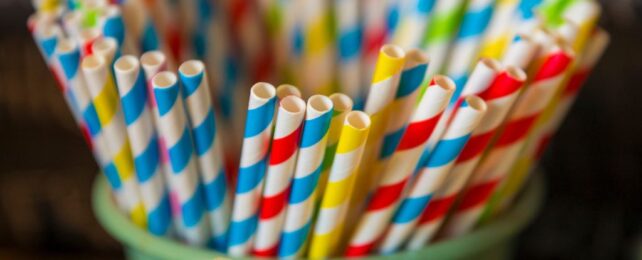Paper straws are not quite the eco solution many had hoped for. Not only do these liquid slurping alternatives tend to wilt in a frustratingly fast manner, they contain low levels of forever chemicals, according to new research.
How that impacts the health of an individual slurper is unknown, but because forever chemicals – also known as poly- and perfluoroalkyl substances (aka PFAS) -- can take centuries to break down to a fraction of their concentration in the environment, these straws are not necessarily 'biodegradable'.
In fact, scientists at the University of Antwerp in Belgium argue that some plant-based and 'eco-friendly' alternatives to plastic may be silently contributing to PFAS pollution.
When researchers tested 39 different straw brands made from plastic, paper, glass, bamboo, or stainless steel, they found PFAS in almost all the materials.
Stainless steel was the only consistent exception.
Today, many products are made with PFAS – a group of 15,000 synthetic chemicals, some of which may be toxic to animal and human health at high enough concentrations.
Scientists are still figuring out at what levels forever chemicals in our surrounds might elevate health risks, but because they can build up in the environment and in animal bodies, scientists worry even low levels of pollution could come back to haunt us.
Cutting back on plastic can help but only substantially if the alternatives are PFAS-free.
To make paper and bamboo straws water-repellent though, many manufacturers appear to add PFAS. Either that, or the producers are using recycled materials that already contain forever chemicals.
The result is the same. In 2021, scientists in the United States were the first to detect PFAS in plant-based straws, indicating that consumers may be ingesting "a so far undetermined amount of PFAS".
Researchers in Belgium have now found the same.
Using high-resolution mass spectrometry, the authors analyzed the chemical composition of 20 paper straws, 5 glass straws, 5 bamboo straws, 5 stainless steel straws, and 4 plastic straws.
They were looking for 29 different PFAS, specifically.
In all but two of the paper-based straws, researchers detected PFAS, although the concentrations were fairly low and varied quite a lot between products.
Forever chemicals were also detected in three plastic straw brands, two glass straw brands, and four bamboo brands.
Among these straws, the most frequently detected PFAS, perfluorooctanoic acid (PFOA), has been banned in most countries since 2020. This chemical can accumulate in an animal's body, where it appears to negatively impact development and reproduction at certain concentrations.
"Small amounts of PFAS, while not harmful in themselves, can add to the chemical load already present in the body," explains environmental scientist Thimo Groffen from the University of Antwerp.
Even after the straws are used, their pollutants could persist. If the straws are recycled, the chemicals could end up in a new product. And if the straws go to landfill or are incinerated, their chemicals will quietly spread in the wind or soil.
For consumers worried about the potential environmental or health effects, Groffen suggests using stainless steel straws, or no straw at all.
The study was published in Food Additives and Contaminants.
